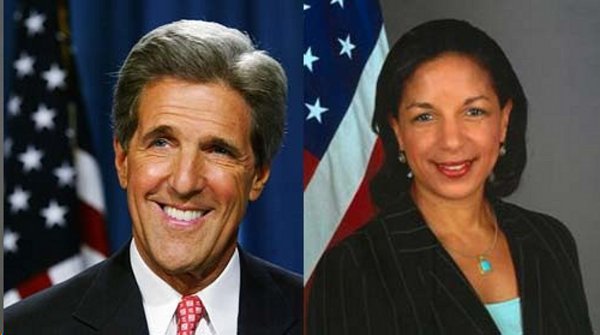Focus Lost: How the Benghazi Attack Became a Political Sideshow

In the nearly four months since the deadly attack upon the U.S. embassy in Benghazi, Libya on September 11th, 2012 that led to the deaths of four Americans, including our ambassador to that country, Christopher Stevens, there remains much to resolve. Who attacked and how that attack was launched and successfully completed with near impunity is still unclear. Initial claims by the State Department that the attack was the result of a spontaneous demonstration protesting the anti-Islamic film “The Innocence of the Muslims” have been firmly debunked. Instead, the assault has been attributed to a well-planned, well-coordinated terrorist attack with informed speculation as to whom the perpetrators were revolving around several different jihadist groups operating in the area, including Ansar al-Shariah, Al Qaeda in the Islamic Maghreb and the Muhammad Jamal network.
That a breakdown in security occurred allowing the creation of the opportunity for such an attack to take place is indisputable; the exact nature of that breakdown is still under investigation by numerous governmental bodies, including several Congressional commissions. One possible failing by the intelligence community that has been hypothesized was that there existed a persistent lack of focus upon the alleged primary participant in the attack, Ansar al-Sharia, as this group was not considered a threat to American interests and therefore was not a priority target by CIA officers responsible for monitoring terrorist groups in Libya.
The first in what is certain to be a long series of reports was issued by a State Department ordered independent Accountability Review Board in which “systematic failures” were blamed for leaving the facility without sufficient protection. The report also confirmed what had already been strongly suspected, that there had been no spontaneous protest as first claimed by the State Department, and that the attack was indeed a carefully planned effort by one or several terrorist organizations. Leadership and management deficiencies at senior levels within two bureaus were cited as being responsible for what was termed as “short-term, transitory” and “relatively inexperienced” security staffing at the consulate, staffing that contained minimal American personnel and was dangerously reliant on local militia for support in case of an attack.
The report does, however, rebut the most damaging accusation aimed at the Obama administration during the weeks and months immediately following the attack, that they had failed to act in a timely manner to assist the embassy personnel once it became clear that an assault was underway. The report concluded: “"The interagency response was timely and appropriate, but there simply was not enough time given the speed of the attacks for armed U.S. military assets to have made a difference.”
The assessment by the Accountability Review Board that appropriate security measures were not implemented prior to the attack is particularly important in informing this country’s future actions in preventing such tragedies from occurring again. Unfortunately, the conclusions of this body have received far less attention than the associated hue and cry of a political nature that emerged immediately following the attack, a cacophony of accusations and politically motivated personal attacks that seemed to have very little to do with what happened in Benghazi and far more to do with settling scores domestically. Surprisingly, those attacks were not aimed at those who could easily be deemed responsible for the security shortcomings clearly present in Libya at the time, figures like Secretary of State Hillary Clinton, Secretary of Defense Leon Panetta and now departed CIA chief David Petraeus largely escaped the vitriol spewed by opponents of the administration.
Instead an unlikely figure, one entirely removed from responsibility for national security arrangements of any kind, our ambassador to the United Nations Susan Rice, became the focal point of Republican fury. Ostensibly the attacks on Ambassador Rice, spearheaded by Senator John McCain, were over her alleged misstatements on a number of talk shows the Sunday following the Benghazi assault. At the time Ambassador Rice pushed the now discredited theory that the responsibility lay with a spontaneous demonstration, much like ones that had occurred in other cities in the Muslim world, sparked by outrage over an obscure anti-Islamic film. In the days that followed it became clear that this was indeed not what had happened; worse, it became apparent that the intelligence community was likely aware prior to Ambassador Rice’s appearances that it had been a terrorist attack and not an impromptu riot that had led to the death of the four Americans. The Obama administration scrambled to defend Ambassador Rice, claiming that she had simply been citing talking points supplied to her by intelligence agencies and that she was disseminating what was thought to be the best and most accurate information available at the time. It was too late. In the tsunami of Republican righteous outrage, led by Senator McCain and abetted by other prominent Republican politicians, Susan Rice quickly became one of the more unlikely political scapegoats in recent memory. Once considered a potential favorite to be nominated as Hillary Clinton’s successor as secretary of state, by December 13th those hopes had been dashed and Ambassador Rice, allegedly of her own volition, withdrew her name from consideration for the post.
That egregious errors had been committed by the Obama administration, both before and after the Benghazi embassy attack, is without dispute. The security situation in Libya following the ouster of Qaddafi had been poorly monitored and measures put into place to protect the American embassy and its personnel had been woefully and fatally inadequate. In the days following the attack, the administration badly fumbled the release of information, first erroneously attributing the attack to a spontaneous crowd demonstration and then compounding that error by sending Ambassador Rice onto the Sunday talk shows to push what was clearly becoming a rapidly untenable hypothesis.

Why Susan Rice of all people was sent out to be the face of the administration on this matter is baffling. Why the intelligence community apparently removed any reference to a potential terrorist attack from her talking points is even more so. What is clear is that the Republicans saw an opportunity to destroy the credibility of a close adviser and political ally of President Obama’s and they pounced with efficient ruthlessness. But to what end? Politicians of the experience and acumen of Senator McCain don’t assail their political enemies haphazardly; there is always an end game. What exactly did McCain and his political allies hope to gain here?
Certainly the removal of Rice from consideration for the position of secretary of state represents a coup, one that only helps perpetuate the perception, one hard to dismiss as anything but accurate, that the entire Benghazi affair, from beginning to end, was handled incompetently. There appears to be, however, more at work here than that. In the days following Rice’s announcement that she would not seek nomination for the post, another successor, one likely to be confirmed without issue, emerged to replace Hillary Clinton. Long serving and well-respected Senator John Kerry of Massachusetts was rumored to be next on the list of Obama favorites, a supposition that was confirmed on December 21st when he was officially announced as the nominee. John Kerry would appear to be, on the face of it, a tremendously qualified person to occupy the post, someone of gravitas, well respected by members of both parties, highly experienced through 28 years of service in the United States Senate, a successful politician and diplomat and decorated combat veteran, one who knows firsthand the horrors of war, never a qualification to be taken likely in the person of the highest ranking diplomat in the United States. If it was the Republican’s aim to force Obama into nominating someone that would be controversial and thus create a long, potentially ugly nomination fight, the attempt failed.
The nomination of Senator Kerry and the successful confirmation process that is presumed to follow does open up another political opportunity for the Republicans to potentially capitalize upon. With his departure from the Senate a successor to his seat must be put into place via a special election. Given the razor-thin margin the Democrats currently hold in the Senate, the loss of even one seat to the Republicans could represent a significant setback. Former Republican Senator Scott Brown of Massachusetts, defeated in November at the terminus of a bruising campaign by now Democratic Senator Elizabeth Warren, has been repeatedly posited as a potential candidate. This has not, however, been confirmed.
On the Democratic side, a strong contender, one who has quickly been provided with definitive support by the Democratic establishment, has emerged to compete for the senatorial post in the figure of long-standing member of Congress Edward Markey. A 36-year veteran of the House with an impressive campaign war chest of $3.1 million, a war chest only likely to be augmented given the immediate outpouring of support that greeted his announcement to run, Markey is a strong candidate. Clearly anything can happen in politics and there is many a slip betwixt the cup and the lip that could occur in the six months or so before the special election would likely be held, but given his base of support, given Massachusetts historically strong Democratic leanings, given the recent re-election of President Obama and the national malaise of the Republican party, it is hard to see this Senate seat going anywhere but right back into Democratic hands. If this represented an end game of John McCain, it is unlikely to bear fruit.
The full intentions of the political machinations aimed at Susan Rice following the Benghazi attack are puzzling. Perhaps it was nothing more than the Republicans taking advantage of an opportunity to embarrass the Obama administration and wound a political enemy. Maybe there were deeper motives. If the latter is indeed the case, it would appear dubious that any of the more likely goals such motives could be ascribed to would be achieved.
What is clear is this: the public focus, which should have been fixed unwaveringly on what were irrefutably serious security errors that led to the tragedy of Benghazi, was wrenched away to instead focus on the output of statements on various Sunday political talk shows and the questioning of the qualifications of Susan Rice that were in no way related to the events in Libya.
As Senator McCain himself repeated relentlessly, American lives were lost at Benghazi and given the obvious lapses in security measures, that is simply unacceptable. Instead of insisting the focus remain on an examination of those security measures in an effort to ensure that any mistakes made were never repeated, McCain nearly singlehandedly created a political sideshow of questionable value that only distracted attention away from the real and important issues. If this distraction in any way detracts from identifying and correcting the mistakes made, then another tragedy could possibly occur, one, like that which occurred at Benghazi, could have been prevented if the right people had been paying attention to the right issues. Let’s hope that’s not the case. Given the number of mistakes made that led directly to Benghazi, efforts of clarity and focus need to be paramount, not political payback.
Author Bio:
Michael Cancella is a contributing writer at Highbrow Magazine.




























































































































































































































































































































